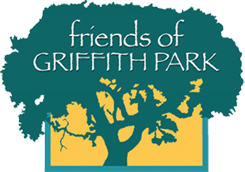Billboard lobby still working to blight parks
To date, at least 44 organized advocacy groups, residential associations, and neighborhood councils have registered their opposition to the changes to the municipal code that are proposed in the latest version of the City‚s Sign Ordinance 08- 2020. The version was discussed by the City Council‚s Planning and Land Use Committee (PLUM) on October 18, 2011 in a hearing chamber crowded with concerned citizens and representatives of the billboard lobby. Eight board members of Friends of Griffith Park were also there.
In response to previous objections, the provision that would have allowed comprehensive sign programs (districts) in City parks has been taken off the table. But an "interior sign exception‰ that would allow advertising to proliferate in parks, recreation centers, and schools, and language allowing Sign Districts to abut parks, rec centers, and scenic highways remains. These loopholes were pointed out by Friends of Griffith Park and others who spoke.
Before the committee voted to send the ordinance back to the Planning Department for further refinement, PLUM member Jose Huizar stated that he wanted to ensure that no mechanism or loophole existed to allow advertising in parks.
That‚s an encouraging sign, but we‚re not out of the woods yet. In a letter to the PLUM Committee dated the day of the hearing, Councilmember Jan Perry urged her colleagues to adopt a sign ordinance provision that would permit signs, banners, and other forms of commercial advertising in City parks and other public facilities. Without such a provision, she wrote the City will be "missing a critical opportunity to create possible revenue through signage at city facilities..." And the PLUM Committee, itself, may have created an inadvertent loophole by agreeing to recommend the establishment of a "Study Group" paid for by the billboard industry that would advise the Planning Department on such "off-the-table topics" as signs in City parks and on other City-owned property. The next version of the ordinance will be released on November 18th and the final PLUM hearing on it will take place on December 6th. Friends of Griffith Park will be there and will continue to oppose commercial advertising in our City parks.
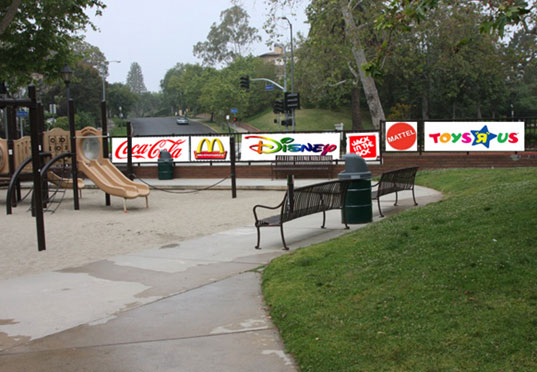
October 18th Meeting - Important to Future of Commercial Signs in Parks
A proposal is still on the table for serious changes to the regulation that governs signs in public and private space throughout the City. The Planning Department document recommending these changes is both lengthy and confusing and was presented at the recent Planning and Land Use Management (PLUM) Committee meeting on Aug 9th. Although many from the public commented that commercial signage in our parks is unwanted, there was also opposite opinion voiced by the attorneys and lobbyists who are paid by the sign industry.
The “signs in parks” issue is embroiled into a much larger proposal which basically provides exceptions to the original City sign ordinance, with provisions such as “Community Sign Overlay Districts” and “Comprehensive Sign Programs.” Although these “carve-outs” supposedly would be subject to community outreach and be custom-tailored to the needs and wants of community stakeholders, we fear that the LOUDEST and MOST-EFFECTIVE “stakeholders” will be the ones that benefit financially – those from the sign industry themselves!
This kind of “loosey-goosey” approach to sign regulation will surely be the “slippery-slope,” paving the way for lots more signs everywhere in LA, including our parks! Additionally, some of the terminology in the proposal remains undefined, such as the term, "City Owned Property." However, based upon a statement made by the Planning Department, City parks most definitely does fit into the category.
The next big showdown on the proposed changes to the Sign Ordinance will occur on October 18th at the next PLUM Committee meeting. Leading up to this meeting, please send your comments to the Councilmembers on the PLUM Committee, and to the PLUM Committee liaison, all listed below.
Send your comments and reference: File 08-2020 for October 18th PLUM Meeting
Ed Reyes: councilmember.reyes@lacity.org
Jose Huizar: councilmember.huizar@lacity.org
Paul Krekorian: councilmember.krekorian@lacity.org
Committee Liaison: michael.espinoza@lacity.org
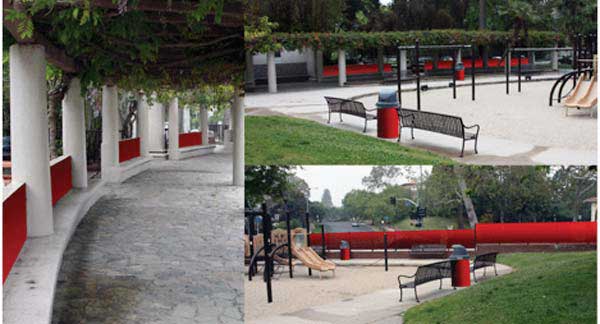
Despite finding of illegality, plan still afoot to sell advertising in parks
Last fall, the city was poised to allow supergraphics promoting Warner Bros. 3-D movie “Yogi Bear,” on fences, shelters, picnic tables, trash cans, light standards, walkways, and other structures in Holmby Park, Pan Pacific Rec Center, and Lake Balboa Park. The deal, approved by the Recreation and Parks Commission, was made by the L.A. Parks Foundation, which is not a city agency, although its Chair, Barry Sanders, is also President of the Rec and Parks Commission. According to its terms, Warner Bros. would donate a total of $57,000 to the Foundation which would then deduct marketing costs and an administrative fee before turning over $42,636 to Rec and Parks.
Park users and neighbors were blindsided by the plan. Upon learning of it, they complained to Councilmember Paul Koretz, who introduced a council motion to rescind Commission approval. At a subsequent Rec and Parks Commission meeting, the City Attorney’s Office informed its Board that their action was a violation of the city’s billboard ordinance. President Barry Sanders told the City Attorney’s Office to “make it legal.”
On April 27th, Friends of Griffith Park attended the City Council’s 2011-12 Budget & Finance Committee Meeting to advocate for proper funding for parks and were dismayed to hear Barry Sanders launch a 20-minute defense of advertising. He opened his remarks with the statement, “This is not a windfall,” admitting that the potential to be gained will not begin to address the parks’ multi-million dollar shortfall or resolve the maintenance, staffing and security losses faced by the system. Given the low return, it is fair to assume that it is the advertisers who will reap the real rewards, gaining unprecedented marketing access to L.A.’s kids.
While budget panel members Parks, Smith and Rosendahl ex- pressed willingness to challenge the ruling against signs, Koretz supported the City Attorney. He also rejected Sanders’ comparison of supergraphic ads to Little League sponsor banners, observing that what Sanders was promoting was a quantum leap in a new and wrong direction. Koretz asked for a solution that would grandfather in league sponsor banners but continue to prohibit advertising. Sanders countered that Rec and Parks should be allowed to make its own regulations and be exempt entirely from the Building & Safety permit process by which we all abide.
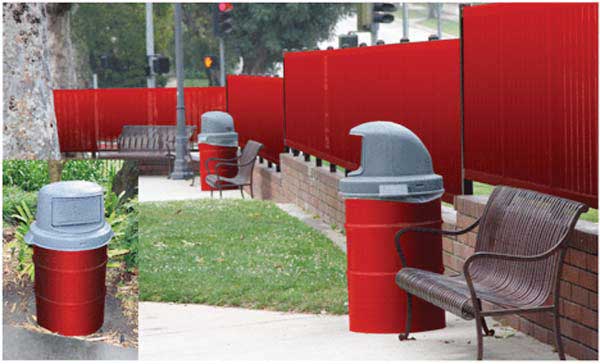
For Griffith Park, the stakes couldn’t be higher. Its picnic tables, walls, fences, play structures, pathways and buildings number in the thousands. Sanders’ assertion that Rec and Parks should be exempt from the city’s permit process is also troubling. Such an exemption would sidestep Cultural Heritage Commission review of proposed changes to landmarks that is triggered during the permitting process. CHC review is a reason why the public supported the Griffith J. Griffith Charitable Trust’s successful initiative to designate the Park as a city landmark.
Keeping commercial advertising out of parks is shaping up to be a citywide battle that will require all of us to pitch in. While the threat has been arrested for the time-being, the L.A. Parks Foundation is still courting potential advertisers and Latham & Watkins, (Sanders’ former law firm) is developing language that would exempt parks from the billboard ordinance. Once this is obtained, who is to say that this new scheme won’t morph into a lucrative contract to be turned over to an outdoor advertising company?
Letters and other expressions of concern should be directed to your City Councilmember and the City Attorney’s Office as well as to Jon Kirk Mukri, General Manager, Department of Recreation and Parks, and all members of the Recreation and Parks Commission, including its President, Barry Sanders. Find their postal and e-mail addresses on the “Contact” page at friendsofgriffithpark.org along with more information and documentation on this issue.
KCET's Blistering Documentary: Billboards in City Parks
Just when you thought Los Angeles, billboard capital of the United States, had begun the process to reduce urban blight, along comes the City's Recreation and Parks Commissioner with an attempt to move the billboards into City parks! A recent segment on KCET's "SoCal Connected" exposed this plan to turn L.A.'s public parks into cash registers by renting park spaces, roofs, bench seats, walls and other available park space for signage.
The "SoCal Connected" segment "Show Me the Money" which originally aired on February 10th, featured extensive interviews with Mr. Barry Sanders, as President of the Los Angeles Recreation and Parks Commission. Sanders is also Chairman of the Los Angeles Parks Foundation, a non-profit entity that can take in tax-deductible "donations." He is an attorney, retired from the law firm of Latham & Watkins. Latham & Watkins has done and continues to advise and provide legal services to the City of Los Angeles in many capacities.
KCET has produced a clear-cut exposé of Sanders' conflict of interest - the hidden dual roles he has as both Recreation and Parks Commission President and L.A. Parks Foundation President. The feature segment illuminates how Sanders has worked hand-in-hand with the law firm of Latham & Watkins trying to create policies that benefit commercial interests. These policies target and exploit children, as well as violate the City's billboard ordinance. The segment aired by KCET relied on interviews, City documents and correspondences obtained under the California Public Records Act.
(UPDATE: Marina del Rey Argonaut reports on Los Angeles Parks Foundation's plan to sell ads on Venice Beach, too!)
When Sanders initially floated the idea at the Recreation and Parks Commission, Deputy City Attorney Arletta Brimsey warned the Commission that these signs - to be situated in City parks - pose a clear violation of City Law. Brimsey informed the Commission these signs depicting movies are prohibited in City parks. Brimsey further elaborated that "you are sending a message to sign companies and corporate sponsors that for a price, it's okay to violate City law."
Sanders, however, refusing to take "illegal" for an answer, asked Brimsey to "advise us how to make it legal." After counseling Brimsey that her role was not to police the Commission, Sanders led the Commission in the approval of the $57,000 deal. The Commission record reflects that the Los Angeles Parks Foundation would be receiving $57,000 from Warner Brothers and then paying "up to $42,636" to the Department of Recreation and Parks. The Los Angeles Parks Foundation would carve out total administrative fees of 27%.
KCET obtained copies of e-mails to/from the City Attorney's office and the law office of Latham & Watkins. According to one e-mail correspondence, Latham & Watkins "wants to help" stop efforts to ban commercial signage in City parks. The solution proposed by Latham & Watkins, was to declare the commercial signage to be "Government Speech."
According to Sanders, the signage in question is "just artwork." He said that "parks are exempt from the sign ordinance" because such signs "are protected government speech." Furthermore, according to Sanders, there are "no constraints on what the government can say."
The beneficiaries of these behind-the-scenes efforts to carve out an exception to City policy happen to be commercial interests who enter into partnerships, also called "alliances" with the Los Angeles Parks Foundation. According to the Foundation's literature, for established rates, an "alliance" (further explained as a "sponsorship only and tax-deductible") with the Foundation includes the following benefits:
- Maximum exposure and name recognition at some of the busiest and most recognizable parks in the Los Angeles area;
- A unique way to educate your audience about merchandise and technology;
- Direct access to an influential and enthusiastic audience targeting broad demographics;
- Opportunities to display, distribute and introduce your products and services (to be determined);
- Alliance with the non-profit Los Angeles Parks Foundation and its beneficiaries;
- Inclusion in special events, extensive marketing materials, website and social marketing.
The Los Angeles Parks Foundation openly markets to corporations with the use of their website, which graphically shows where various signage opportunities are available at numerous City parks. Even a rate sheet is available online.
The Warner Brothers Yogi Bear deal has been dropped, as it did not receive approval by the City Council, due to Councilmember Paul Koretz's questioning how it had quietly been carried forward by the Commission, despite the City Attorney's objection. Time ran out since the Warner Brothers project was time sensitive; they needed the signs in place BEFORE the release of their Yogi Bear movie, not after!
If you have a child, you are already aware of the importance of engaging your child in commercial-free creative play. In the formative stages of children's lives, values are being shaped that will last a lifetime. Research tells us that creative play is the basis for learning, critical thinking, self-regulation, problem solving, and creativity.
With television and computers more than ever present in a child's life, experts have declared there is systemic crisis for normal child development. The American Academy of Pediatrics, for example, recommends no "screen time" for children under age 2 and no more than 2 hours a day of screen time for older children, to reduce the influence of commercials.
The influence of commercial marketing on our country's children is profound. One of the best ways to encourage creative play is in a nearby park, in open space, with nature. However, if the play-space is plastered with commercials, the whole point of going to the park is lost.
KCET, having a rich history of meeting the educational needs of children, deserves much credit for bringing the urge to "sell our parks" to light.
View the entire 13 minute KCET video, "Show Me the Money"
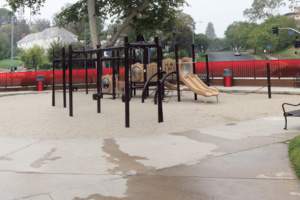 KCET's airing of "Socal Connected" illustrated that The Los Angeles Parks Foundation's website is used to market signage rights and to show where they are available in our City parks. |
